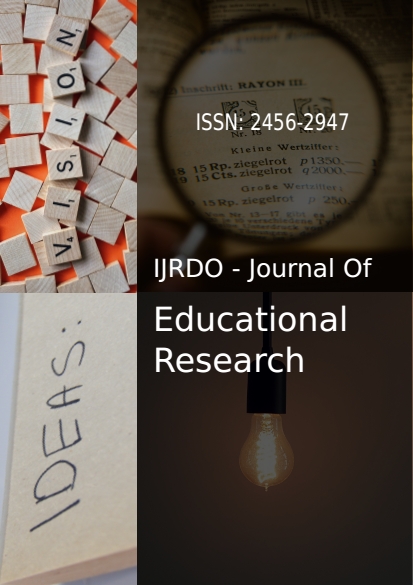INFLUENCE OF CODE SWITCHING ON MASTERY OF ENGLISH SPEAKING SKILLS IN SECONDARY SCHOOLS IN KWANZA SUB-COUNTY TRANS-NZOIA COUNTY, KENYA
Abstract
The purpose of this study was to look at the influence of code switching in the teaching of speaking skills in secondary schools in Kwanza Sub-County. The study was based on Krashen Model of affective filter hypothesis (Krashen, 1985) which states that a number of affective filter variables play a facilitative role in second language acquisition. In addition Lev Vygotsky’s social Development Theory (Crawford, 1996) which states that learning contexts play an active role in language learning. The study used descriptive survey design research. The sample was drawn from eleven secondary schools in Kwanza Sub-County. The sample size in this study consisted of eleven (11) secondary schools from a population of 36 secondary schools. They were selected through stratified random sampling. Eleven (11) principals were purposively selected to the sample and 22 teachers were randomly selected with each school giving two teachers. Teachers were also randomly drawn to serve as sample members in the study. The study found that code switching may lead to corrupting the use of English language; which could eventually lead to code mixing resulting into unstable forms like Sheng’. However, it is worth noting that secondary school students’ English language competence is still developing and their performance aspect involves code switching. Nevertheless, in using code switching in speaking to students, teachers encourage them to code switch in their conversations. This enhances communication but could undermine the mastery of English language especially in written communication. It may hamper development of the learner in expressing himself or herself in written communication. Thus code switching provides an avenue for those who cannot express themselves in one language. Ultimately, the speaker develops speaking skills in the languages involved code switching. Code switching enhances learning of speaking skills especially at secondary school level. Therefore, secondary school students will improve their speaking by use of code switching. We should keep in mind that by code switching, the development of skills of a speaking in the target language is likely to take longer that if the skills were entirely taught or learnt in the language itself. It is worth noting that, with code switching, performance in English grammar, composition and speaking skills is adversely affected. This in turn affects the general performance in academics as most examinations are set in English.
Downloads
References
Abagi O. and Odipo G (1997), Efficiency of Secondary Education in Kenya; situational analysis and implications for Educational reforms. Institute of Policy Analysis Research (IPAR), Kenya
Ayeomoni, M.O. (2006). Code-Switching and Code Mixing style of Language use in childhood in Yoraiba.Nordic Journal of African Studies.
Barasa L.P, (2004) English Language Teaching in Kenya Policy, Training and Practice. Moi University Press.
ENABLE(2006). Education Sector policy. Overview paper ENABLE: Nairobi
IPAR(2008). Radical Reforms for Kenya’s Education Sector: Implementing policies Responsive to Vision 2030
Kembo Sure, Nathan Ogechi (2008) Linguistic Human rights and language Policy in the Kenyan education system. OSSREA: Ethiopia
KIE (2006) Secondary English Handbook. KIE: Nairobi
Kioko, A. Muthwii M. (2001). The demand of a changing society.Vol 14, No. 3 2001
KNEC (2010).Monitoring Learner Achievement Study for class Three in Literacy and Numeracy. KNEC: Nairobi
KNEC (1994).1991 and 1992 KCSE Examination Report. Nairobi: Kenya National Examination Council
MOEST(2003). Report of the Task Force on Implementation of Free Secondary Education. Nairobi: Jomo Kenyatta foundation
MOEST (2005). A Policy Framework for Education, Training and Research Sessional Paper 1 of 2005, MOEST Nairobi
Mpuga, D. (2003) The Official Language Issue: A look at the Uganda experience: paper presented at the African language Research Project Summer Conference. Ocean City, Maryland America
Muthwii M.J. (2002) (ed) Language Policy and practices in Education in Kenya and Uganda , Phoenix Publishers.
MwangiKimeni (2003) Determinants of Educational Achievement in Kenya since the introduction of FPE, DFID.
Muysken, P and Milroy, L (1995) One Speaker Two Languages; Cross-disciplinary Perspectives On Code switching; Cambridge. Cambridge University Press.
Myers-Scotton, C (1993) Duelling Languages: Grammatical Structure in Code switching.Oxford : Oxford University Press.
Myers-Scotton, C M. (2002) Contact Linguistics; Bilingual encounters and Grammatical Outcomes. New York. Oxford. Oxford University Press.
Myers-Scotton, C M. (Ed) (2000) Language in Kenya. New York. Oxford.
Nettle, D & Romaine, S. (2000) Vanishing voices. The Extinction of the Worlds Languages
Nguyen, T (2008) The Sociolinguistics dimensions of Code switching. Examination Thesis, 2008.English language and Literature studies- Linguistics.
NLP (1998). Teaching Styles and Cognitive Processes in Language Learning NPL, South Africa
Ogutu, T.A (1993). Towards Standardization of the Kenyan variety /varieties of English.in English Across the Curriculum – the Kenyan context (pp 76-85). Nairobi: British Council
Paradowski, M.B (2008). The Benefits of Multilingualism.Multilingual living Magazine.
Shitemi, N.L. (2007). Language Planning: Global Challenges and Inspirations for Africa: A Journal of Humanities and Social Sciences Volume 2 No. 2 2007, Moi University Press: Eldoret.
Copyright (c) 2020 IJRDO - Journal of Educational Research (ISSN: 2456-2947)

This work is licensed under a Creative Commons Attribution-NonCommercial-NoDerivatives 4.0 International License.
Author(s) and co-author(s) jointly and severally represent and warrant that the Article is original with the author(s) and does not infringe any copyright or violate any other right of any third parties, and that the Article has not been published elsewhere. Author(s) agree to the terms that the IJRDO Journal will have the full right to remove the published article on any misconduct found in the published article.



